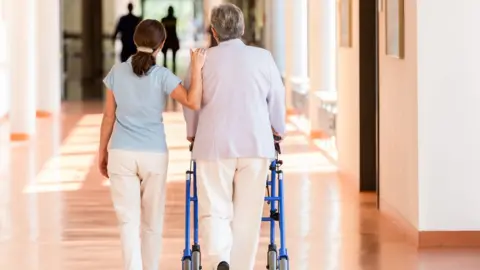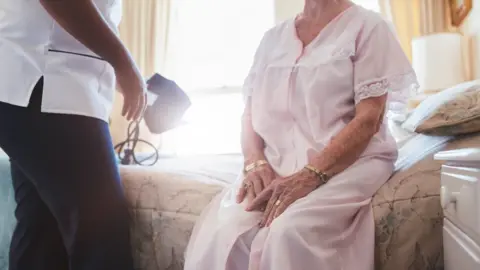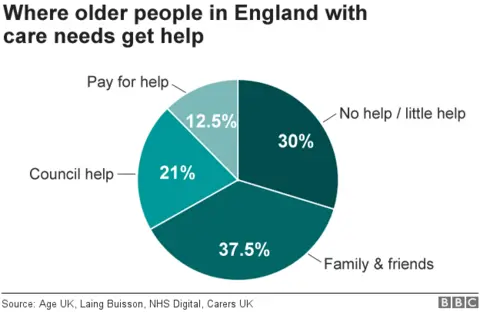Vulnerable told to expect cuts to council care
 Getty Images
Getty ImagesThe elderly and disabled in England are being told to expect cuts to care services and rises in charges after council chiefs unveiled spending plans.
The Association of Directors of Adult Social Services said £20.8bn was expected to be spent on care this year, a cash rise of 5% since last year.
It follows a £1bn cash injection announced in the Budget which ministers said would relieve the pressures.
But ADASS said £824m of savings were still having to be made.
The group, which represents social care directors, said rising demand meant cuts were inevitable given the current funding levels.
The warning comes after ADASS surveyed 151 council care chiefs about their plans for 2017-18.
The polling suggested councils would spend £14.2bn of their own money, rising to £20.8bn when the £1bn cash injection - money from the NHS for care projects and the fees users are asked to contribute - are taken into account.
How savings will be made
ADASS said care chiefs could make some of the savings through improved efficiency, but added those using services - whether in their own homes or in care homes - should still expect those services to be rationed even more.
Over 1m people rely on council care services, two-thirds of them older people.
ADASS said the cuts could mean people being denied help, given shorter visits or fewer options for support.
The council chiefs also predicted user charges would also rise in places.
Care providers - the companies that run care homes and home care services - were also told to expect their fees to be squeezed.
 Getty Images
Getty ImagesNearly three-quarters of directors of adult social services said they were pessimistic about the future of the system.
It comes after years of cuts - since 2010 over £6bn of savings have had to be made.
ADASS president Margaret Wilcox said the system remained on a "cliff edge".
"The need for a long-term solution has never been more urgent or vital," she added.
The government's plans
The verdict comes as doubts remain about the government's intentions for social care.
During the election campaign, the Conservative party indicated it wanted to raise more through charges by always taking into account the value of people's homes when working out what they should contribute towards their care.
The policy proved controversial though, being dubbed a dementia tax.
Ministers have subsequently distanced themselves from it and promised a fresh consultation on reform.
In the meantime, an extra £2bn is being invested in social care - £1bn this year and another £1bn spread over the following two.
On top of this, councils have been given permission to increase council tax to pay for care.
Nearly all are doing that this year with seven in 10 councils raising it by the maximum of 3%.
A Department of Health spokesman said ministers were aware changes were needed to "put social care on a more secure financial footing" and that was why a green paper would be set out in the near future.
Cuts will have 'devastating impact on vulnerable'

Mark Atkinson, of disability charity Scope, said cuts to services had a terrible impact on the vulnerable as it meant they "do not receive the care they need to do the basics in life such as getting washed, dressed and leaving the house".
And Chris Hopson, chief executive of NHS Providers, which represents hospitals, also predicted the difficulties in the social care sector would have a knock-on impact on the NHS, which relies on care services to get the frail out of hospital.
He predicted it would be a "very difficult" winter.
And Councillor Izzi Seccombe, of the Local Government Association, predicted the situation could get worse. The LGA, which represents councils, has forecast a budget shortfall of £2.3bn opening up by 2020 unless the system is reformed.
"Adult social care is at a tipping point, and unless urgent action is taken we will continue to see more and more of the consequences of underfunding that we have seen in recent years, particularly care providers either handing back contracts to councils or ceasing trading altogether."
